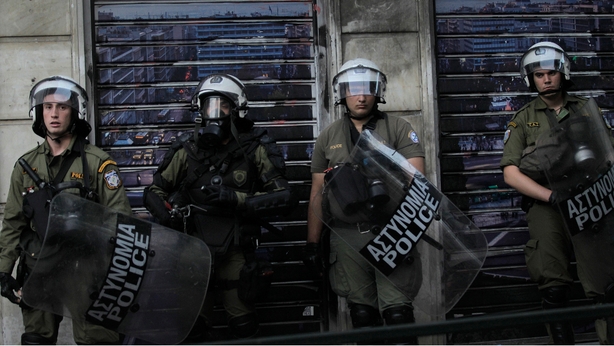Greece has submitted an official request to the International Monetary Fund for a new loan as it seeks a huge third bailout from its creditors, the finance ministry said.
"We would like to inform you that we are seeking a new loan facility from the International Monetary Fund," Finance Minister Euclid Tsakalotos wrote in a letter to Christine Lagarde, the managing director of the IMF.
Earlier, talks on tying up a new bailout deal for Greece failed to start as had been expected, with officials blaming security worries for delaying the negotiations with international creditors - who are detested by many Greeks.
Greek government officials had said this week that the talks on the third bailout programme worth up to €86bn would start in Athens today.
But representatives of Greece's creditor institutions - the European Commission, the European Central Bank and International Monetary Fund - said they cannot begin until the right location is found, given the talks' sensitivity and the wide public anger about austerity policies imposed under the first two bailouts.

"There are some logistical issues to solve, notably security-wise," a European Commission official said.
"Several options are on the table," the official said, without giving more details.
The Greek parliament has already approved two packages of reform measures, a prerequisite for starting the formal negotiations to hammer out details of the new bailout.
However, another source close to the talks said Greece had been asked to do more on reforms before top international officials could come to Athens.
The government of leftist Prime Minister Alexis Tsipras held five months of acrimonious talks with the creditors before they finally offered to start talks on a new bailout - and only after the government missed a debt repayment to the IMF and had to close local banks for three weeks.
Mr Tsipras accepted the creditors' terms even though Greek voters had rejected an earlier offer in a referendum.
Athens hopes this time the negotiations will be quick and can be concluded by 12 August so the deal can get parliamentary approval before a bond repayment to the ECB falls due on 20 August.
At the moment, only technical talks are under way to sort out logistical issues. One government official said he hoped negotiations with the institutions' mission chiefs could start tomorrow.
A European Commission spokeswoman said only that negotiators from the institutions, including the European Stability Mechanism rescue fund, were expected to go to Athens "in the coming days".
